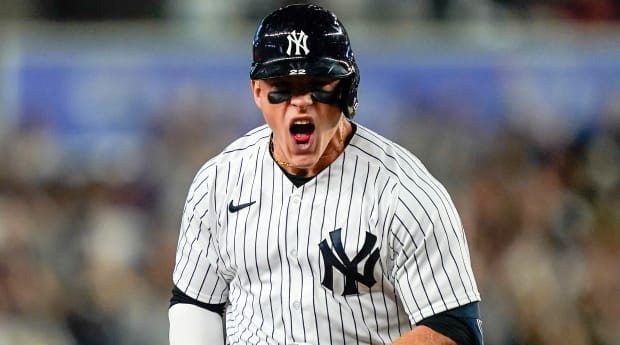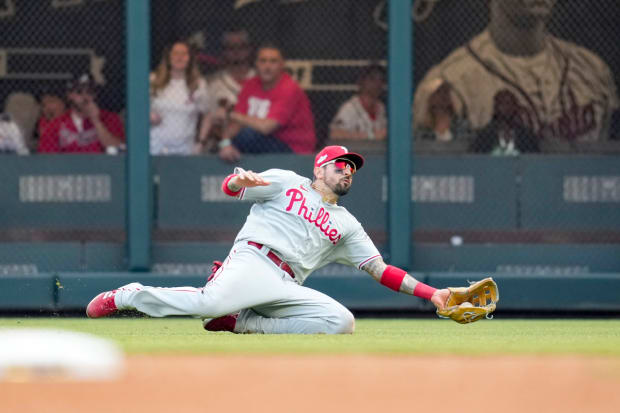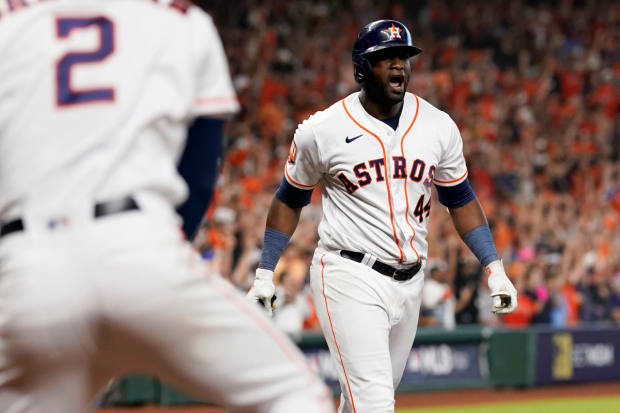
John Minchillo/AP
Yesterday was the first day of the four division series. It was also the first time I ever attended a postseason game.
Presumably, some of you reading this newsletter have experienced the atmosphere of playoff baseball in person. If you haven’t, you surely have read some of our game’s greatest scribes, who have eloquently reconstructed the scenes with such vibrant imagery that your memory of these moments is a collage of what you saw on the screen and felt from words on the page.
This is the great privilege of covering baseball. More than tapping into trade rumors and second-guessing managers—and certainly more than spending the occasional winter moonlighting as a labor relations reporter—the best part of this job is bringing the game we get to see in person to all of you watching from afar.
In the top of the third inning at Yankee Stadium, I saw a few things from the press box that flipped the momentum of the game from the Guardians to the Yankees, instances that couldn’t come through as easily on TV, no matter how many different replays and camera angles the broadcast provided. Here’s what happened …
Gerrit Cole had labored through the first two innings as the Cleveland batters worked deep counts their first time through the order. They fouled off nine pitches in the first and three more in the second. Cole wasn’t missing his spots so much as the Guardians’ contact-heavy approach was pecking away at some tough pitches to drive up his pitch count. He kept trying to go a little bit more toward the corners, and the batters kept spoiling the ones that were on the black and taking the ones that just missed. After two innings, Cole had thrown 39 pitches. His frustration was palpable. He wasn’t gesticulating angrily, and, from above, I couldn’t have noticed any more subtle signs of irritability from him. The tension tightened with every fouled-off offering and ball call. It snapped with one out in the third, when Steven Kwan, he of only six home runs all season, lofted one over the short porch in right. 1–0 Cleveland.
Kwan sprinted around the bases faster than any home run trot I had ever seen, as if challenging his teammates to take Cole deep, too, if only so they could attempt to complete the circuit faster than he did.
The next batter, Amed Rosario, who reached on a hit by pitch, went on a mad dash of his own when José Ramírez smoked a double into the left-center gap. Rosario should have scored, and Ramírez possibly could have advanced to third on the relay to the plate, which would have set up more runs for the Guardians and another elongated inning for Cole. Cleveland was bound for a stunning, soul-crushing Game 1 victory, everyone in the stadium could feel it. Except for Harrison Bader.
The best defensive center fielder in the league glided across the gap at full speed, snagged the skipping shot, stopped abruptly, turned his body and unleashed a perfect toss to shortstop Isiah Kiner-Falefa, who in one motion received it over his left shoulder and relayed it to the plate. Rosario wisely stayed put, leaving the fate of the game teetering between the two teams.
Things got weird when Josh Naylor stepped in and hit a ground ball right at first baseman Anthony Rizzo. Rosario broke for the plate. Rizzo saw this and immediately fired home to Jose Trevino, who upon catching it immediately dropped his left knee into the baseline, swiped his mitt to tag Rosario before he could touch home and instead felt nothing but air. Marvelously, Rosario halted his burst and reversed toward the bag like Saquon Barkley jump cutting through a backside hole. By the time Trevino found his feet and threw to third, Rosario was safe and Naylor had reached first on a fielder’s choice.
“He fully committed to home. That's what you look for as an infielder,” Rizzo said. “For me, I want to get the ball to the catcher pretty early so they can get in position to tag them. Because of the new rules and blocking the plate, guys are able to hook-slide.
“I feel like I took my time there to make sure he was committed home and he was committed home and he pumped the brakes. It's a good baserunning play.”
Indeed, it was. Rosario’s fakeout is the only reason the Yankees didn’t record an out on what otherwise was a routine play. Bases loaded. One out. Cleveland appeared to have retaken control, but in fact, the opposite was true. It was New York’s game now. The fielder’s choice set up a force at every base, which allowed the Yankees to throw out Rosario at the plate easily when Óscar González followed with a grounder to third. He whiffed Andres Giménez on a nasty slider to escape the jam. The score remained the same. Everything had changed.
Bader led off the bottom of the inning with his first home run as a Yankee, a highlight that he and fans alike will remember for a long, long time. The dinger tied the game; it was his catch that saved it.
Have any questions or comments for our team? Send a note to mlb@si.com.
1. THE OPENER
“The great Sandy Koufax, who averaged almost eight innings in his seven postseason starts, took his usual lower box seat to watch another Dodgers relay race of pitchers take place. Imagine if Truffaut were around to watch TikTok videos and you get a sense of how much playoff baseball has changed.”
Good news, everybody, Tom Verducci Playoff Ledes are back and just as great as ever! Here he is, from Los Angeles after the Dodgers’ 5–3 win over the Padres in NLDS Game 1, writing about how the Dodgers will run their pitching staff during the postseason.
Dave Roberts Unveils the Dodgers’ Unorthodox, Effective Bullpen Blueprint by Tom Verducci
Los Angeles’s manager has made operating without a closer an advantage for baseball’s best team.
2. ICYMI

Dale Zanine/USA TODAY Sports
Each Game 1 had its own interesting moments and takeaways. Let’s run through some of them here.
Surprise! The Phillies Can Do No Wrong by Emma Baccellieri
Somehow, the team known for its bad bullpen and bad defense is playing mistake free baseball. How long can this continue?
Gerrit Cole Shines Under the Bright Lights in the Bronx by Stephanie Apstein
Pitching in his first postseason home game as a Yankee, Cole exhibited escapability that’s occasionally eluded him with New York.
SI:AM | Why Did the Mariners Go With Robbie Ray? by Dan Gartland
The Astros came back from two different four-run deficits and won on Yordan Alvarez’s walkoff three-run blast. Seattle gave us plenty to second guess.
3. WORTH NOTING from Stephanie Apstein

David J. Phillip/AP
This seems impossible, but it’s true: With Yordan Alvarez’s preposterous blast to end the Astros–Mariners game, he became the first player in MLB postseason history to hit a walkoff home run with his team trailing by multiple runs.
4. W2W4 from Will Laws
Only the NLDS matchups are scheduled for today, with the Dodgers hosting the Padres at 8:37 p.m. ET, and the Braves and Phillies hopefully facing off at some point this afternoon or evening. The game was initially scheduled for 4:35 p.m. ET, but the game has been delayed due to bad weather in the area. Emma is at Truist Park waiting out the storm, so follow her on Twitter for updates (@emmabaccellieri).
Either way, whenever the game does begin the defending World Series champions will be under significant pressure to win following their loss yesterday. Brian Snitker’s crew certainly doesn’t want to head to Philadelphia needing to sweep the rest of the series, including two games in a hostile, raucous environment that hasn’t hosted a playoff game since 2011. The Braves will rely on MLB-leading, 21-game winner Kyle Wright to even up the series—at least for a little while. If things start to go haywire, expect Snitker to have an exceedingly quick hook with Raisel Iglesias, A.J. Minter, Kenley Jansen and Spencer Strider all unused yesterday and a travel day before Game 3.
Wright and Zack Wheeler, Philadelphia’s Game 2 starter, had eerily similar surface-level results in this divisional rivalry during the regular season. Wright faced the Phillies three times and allowed six earned runs in 19 innings (2.84 ERA). Wheeler faced the Braves three times and allowed six earned runs in 20 innings (2.70 ERA). But the routes they took there are quite different. While Wright posted a pedestrian 15–7 K/BB ratio with just eight hits allowed in those outings, Wheeler recorded an absurd 25–1 K/BB ratio against Atlanta, albeit while giving up 18 hits. That indicates the Braves like to take an aggressive approach against Wheeler, who possesses the fifth-most valuable fastball among the 62 pitchers with at least 150 innings pitched, per FanGraphs. Atlanta was graded by FanGraphs as the second-best team at hitting fastballs this season, so something’s gotta give.
5. THE CLOSER from Emma Baccellieri
The Phillies can rejoice in at least one regard: They finally get to go home (briefly) after today’s game. Their last home contest was Sept. 25. After ending the regular season with a 10-game road trip to Chicago, D.C. and Houston, they began the playoffs on the road in St. Louis and now Atlanta. “We’ve been on the road forever now, it feels like,” pitcher Zack Wheeler said yesterday. But that comes to an end tomorrow, and the team will return either tied in the NLDS, or up two games to none. Not a bad way to go home.







